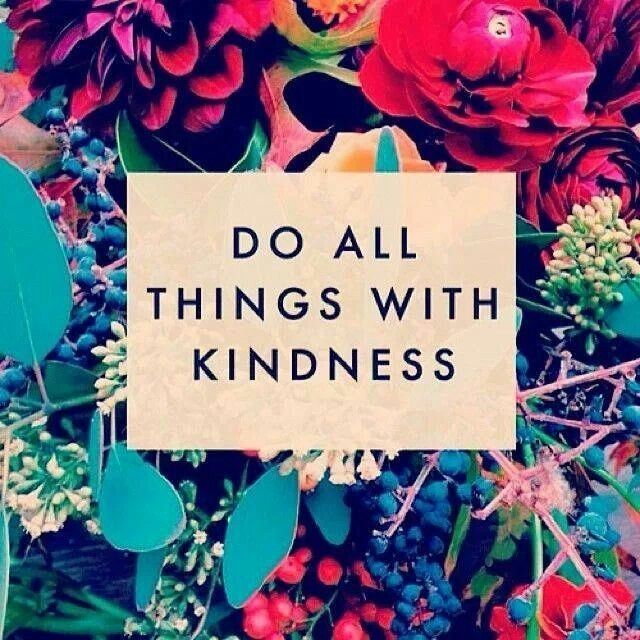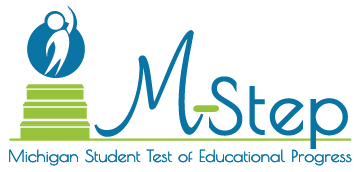THIS WEEK’S EVENTS
Monday, May 29 — NO SCHOOL MEMORIAL DAY
Tuesday, May 30 — School Improvement Team Meeting 7:40 a.m.
Last Yoga Club 8:15 a.m. — parents welcome!
Metzger visit to PCCS all day
DRA 1st Grade
NWEA 3rd Grade Math
NWEA Yesh in Lab 12:20 p.m.
AP Library Visits (2:00 – 2:30–Kindergarten, 2nd grade, and 3rd grade (all classes); 2:35 – 3:05–1st grade, 4th grade, and 5th grade (all classes))
Wednesday, May 31 — ELA Committee Meeting
NWEA 5th Grade Math
Walk to MS for RR students
Sports & Fitness Club 3:30-4:15 p.m.
Mindfulness Group 3:45-4:30 p.m.
Thursday, June 1 — Literacy Library Closes
Mindfulness Group 7:45 a.m.
3rd Grade Field Trip to River Raisin Battlefield
Garden Club 3:30-4:30 p.m.
ICC 4:00-6:00 p.m.
PTA Meeting 6:30 p.m.
Friday, June 2 — Last day for 35a Aides
Reading Specialists Luncheon
ASL Club 3:45-4:30 p.m.
LOOKING AHEAD
6/5 — 3rd Grade Walking Field Trip to Major Tomato
Klein Pen Pals Field Trip to Barnes & Noble
6/6 — Summer School Meeting at Riley
MTSS/Data Team Meeting 3:30 p.m.
6/7 –Mindfulness Group 3:45-4:30 p.m.
6/8 — Mindfulness Group 7:45 a.m.
Simonds Play APCA 10:00 a.m.
PBIS Ice Cream Reward
MTSS Meetings all day in Office Conference Room
PBIS Meeting 3:30-4:30 p.m.
Simonds Play APCA 7:00 p.m.
6/9 — Last day for 31a & Title I aides
3rd Grade Field Trip to Thunderbowl
ASL Club 3:45-4:30 p.m.
6/12 — Field Day K-2 AM; 3-5 PM
PBIS Basket Raffle preview/ticket drop
Metzger to Riley in AM
Mrs. Lauth family potluck — Courtyard
6/13 — 5th grade brunch
PBIS Basket Raffle distribution
1/2 Day 11:40 Dismissal
Class List/Scheduling Meetings beginning at 12:30 p.m.
6/14 — 5th grade Awards Ceremony 10:00 a.m. Cafeteria
Kindergarten Year-End Celebration
1/2 Day 11:40 Dismissal
6/15 — LAST DAY FOR STUDENTS
1/2 Day 11:40 Dismissal
6/16 — LAST DAY FOR STAFF
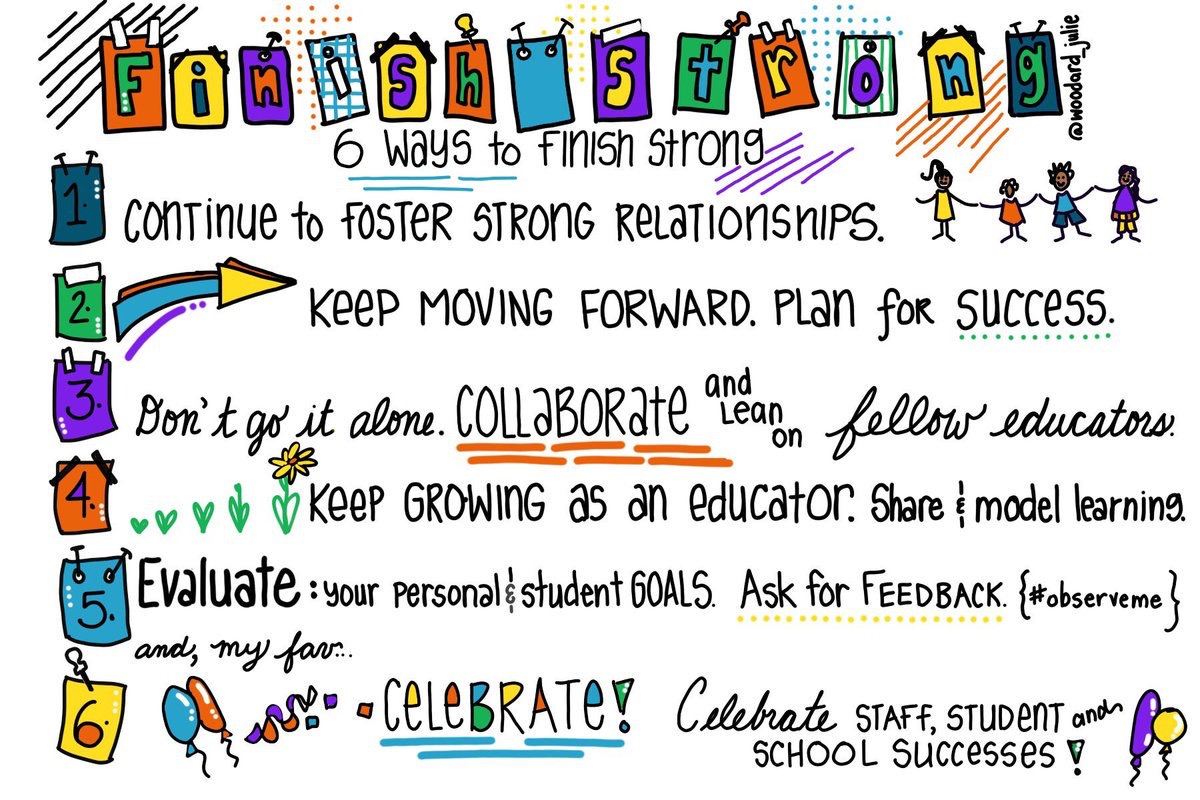
MAKING THE MOST OF WHAT’S LEFT
This time of year has its own unique blessings and challenges. On one hand, you are able to see the fruits of your labor as students demonstrate so much growth and progress since September. On the other hand, as we grow weary, we find ourselves reacting to behaviors that can interrupt the learning process. In these last three (!!) weeks of our year together, I challenge you to find an opportunity for growth in each challenge. Many of us are studying the practice of mindfulness. Although the course is focused on adult learning, please know that any personal growth you experience will directly benefit students. Take a moment to breathe and choose your response to a situation, rather than reacting. Provide students with the opportunity to take a mindful breath or two in the midst of a conflict. Make these last days count for our students! Please let me know how I may best support you as we bring this year to a close.

YEAR END SURVEYS
Please take a few moments and complete these year-end surveys for our MTSS program and Math in Focus program. We appreciate the feedback you have given us all year long, and are looking forward to your final thoughts so we may improve for next year!
Math in Focus Survey: https://docs.google.com/a/appublicschools.com/forms/d/e/1FAIpQLSfIgv964WvXuLWYa68E8WX3nE1M0S-_KuKmpupPAdkuz1IAXg/viewform

YEAR END TO-DO LIST
Please remember to check the Year End Checklist page at the top of the blog for all of the to-dos as we wrap up the year. Several items were “due” today, so we are making progress! As final walkthroughs are completed and final testing recorded, please check the calendar and schedule a time that we can meet and have our final evaluation meeting!
STAGES UPDATE
You have received a document outlining the steps needed to complete elements in the STAGES system for the final evaluation. Please let me know if you have any questions!
**Reminder — if you are using NWEA for your evaluation data, you will find the scores in the report titled “Achievement Status and Growth Report: Projection or Summary.” Make sure you select the Growth Comparison Period as Fall 2016 through Spring 2017. I am happy to help you if needed!
If you are using DRA, please be sure your data is entered into MISTAR DnA as soon as you finish testing!
PreparingtocompletefinalevaluationinSTAGES-27fna9f


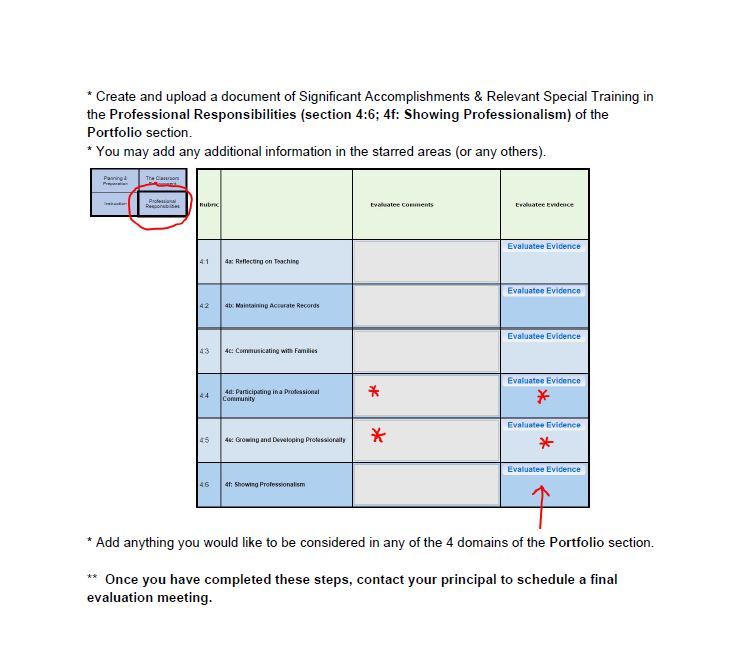
MSTEP COMPLETE
Congratulations to all students for completing this year’s M-STEP assessment! We are proud of our students and the effort they gave on these state assessments. Preliminary data is beginning to arrive. I will share this with you soon. Thank you to all staff for your flexibility and willingness to accommodate adjusted schedules and limited Chromebook access during this testing window. I appreciate your support!

CLASS CREATOR
You should have received an email from Class Creator for class list creation for next year. Thank you for your patience while we ensured that the proper data was uploaded to preserve “historical” data from last year for students. This should enable you to see where students were requested to be separated or paired with other students last year at this time.
Under “Special Education” you will indicate student supports in the MTSS program (Tier 1, 2, 3). Please remember to check whether students received support in literacy or math for these tiers.

MINDFULNESS UPDATE
Hopefully, even if you are not “officially” enrolled in the Mindfulness course, you are able to take a few moments to read the reflections of the groups each week. It really is a great way to see what ideas are out there about our new practice.
One of the questions that came up in the reflections this week is when we are going to learn more about working with students. We really aren’t. That is up to us. This course is Mindfulness Fundamentals. It is for us, as adults who are working with children. There is a section in each week called “Practicing Mindfulness While Working With Youth” which has a few tips related to each week’s practice.
When enrolling our group in the course, I was describing our format of working individually, then meeting weekly in groups, to the coordinator. She said this was a great strategy. Her other statement that has stuck with me was, “We feel that it is better to teach mindfully than mindlessly teach mindfulness to students.”
At its heart, this course is for YOU. By embracing the fundamentals of mindfulness, it is our hope that we will have many collective experiences and thoughts to create a vision for what we want our learning environment to become. This is necessary as students are coming to us with a variety of needs, experiences, and struggles.
NGSX OPPORTUNITY
Please see the message below from Phil. If you are around this summer, I would definitely encourage you to consider participating in this training. It is a big shift in science instruction and the experience is so valuable!
Good morning, teachers!
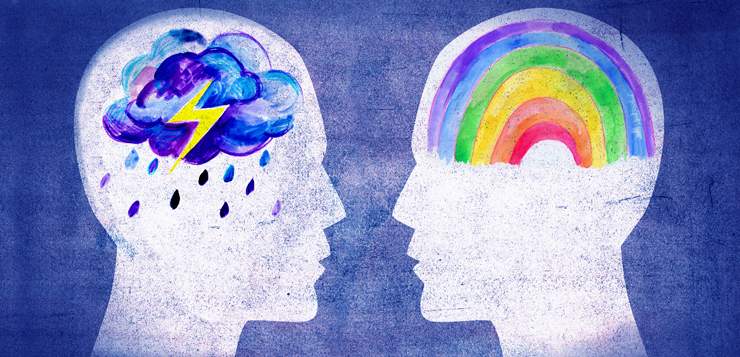
INTERESTING ARTICLE
How to Fight Stress with Empathy
We often use the words “I’m stressed” casually in our everyday conversations, with little acknowledgment of the adverse effects of stress in our lives. But evidence suggests that we should be much more concerned about our stress levels than we are.
The Center for Disease Control found that 66 percent of American workers say they lie awake at night troubled by the physical or emotional effects of stress, and stress has been linked to many health problems, including obesity and heart disease—especially among low-income Americans. Stress not only affects us, but it can impact those around us, too, especially our children.
Variables That Determine How Stress Affects Us
Not all stress is bad, of course. Stress can also be invigorating or lead us to care about the welfare of others, if channeled in the right way. Nor is it always avoidable—many of us have lives with stressors beyond our personal control. But, psychologists have identified key variable that determine whether stress ultimately affects us positively or negatively:
- Our perception of stress
- The meaning we attach to it
- Our ability to cope with uncertainty and ambiguity
- The degree of control we have over the circumstances that produce the stress
In my experience, many people don’t recognize the role that their own perceptions, fueled by biases, play in exacerbating stress. By becoming more aware of our biases in perception, we can learn to focus on the truthful assessment of situations we encounter without distorting reality, thereby remaining calm, energetic, creative, and resilient when faced with highly stressful situations.
As a psychologist, I’ve worked with countless people who suffer from debilitating stress in their lives, often without recognizing how it impacts their health, relationships, and work lives. In my book, The Stress Solution, I provide an outline of the research-based steps I often give to my clients so that they can learn to manage stress in more positive ways.
To some extent, we can reduce stress by simply taking good care of ourselves through getting proper sleep, exercise, and nutrition. But, to really thrive in the face of stress, we should also work toward finding meaning or purpose in our work or other activities, and toward nurturing our positive relationships using empathy.
Leading with empathy can help those around us to be sources of support in our lives and reduce the likelihood of interpersonal conflicts.
Why use empathy? Because when we give and receive empathy we produce the near magical neurotransmitter oxytocin, which creates a sense of trust and cooperation—keys to negotiating and resolving conflict, whether between couples, communities, states, or countries. Leading with empathy can help those around us to be sources of support in our lives and reduce the likelihood of interpersonal conflicts.
Of course, it may be difficult to imagine feeling empathic when we are angry or tired. Think of a couple reuniting after a long day of work. Without first connecting through empathy and love, they may end up fighting over whose turn it is to do the dishes or simply withdrawing from each other, depriving themselves of the comfort that closeness brings.
Empathy Practice: Listening
How to avoid this? By practicing empathic listening with one another instead of falling on our usual patterns.
Too many of us listen to each other with half an ear, preoccupied and not fully present. We tend to listen with bias, making up our minds before we hear the full story, or to connect everything the other person says to our own experience without considering their perspective. We then make well-meaning comments that do not honor the uniqueness of the other’s person’s thoughts or feelings, such as, “I know what you’re going through.” Or, we get distracted by the noise of our internal voices and end up judging or second-guessing one another, which keeps us from really listening. Without truly listening, we run the risk of losing connection and making false assumptions.
What does empathic listening look like? It requires giving up a self-centered view of the world, focusing and paying attention, and setting aside biases or distorted thinking to connect with another person’s emotions. It means coming to your interactions with a true desire for connection and understanding, rather than winning.
Empathy is easier when we understand some of the stories we carry inside about who we are and learn to see how it clouds our reactions and judgments. If we have been humiliated in childhood or starved of attention, we may have trouble trusting others or feeling comfortable with intimacy. Couples who fight a lot often carry stories like these about themselves—perhaps feeling unworthy because of past hurts—that make it hard for them to be present and more vulnerable to their partners.
But, when people learn to respond with empathic listening, it can help them to shift from their stories and distorted ways of thinking. They become less likely to take something done or said personally, assume that other people hold similar attitudes to one’s own, or focus only on the negative instead of the positive in a situation.
7 Ways to Increase Your Empathic Listening Skills
Here are some of the recommendations I make to help people enhance their empathic listening and their ability to express empathy:
- Reflect what others say to you by either repeating or rephrasing what someone has said. It sounds like you had a lot going on today at work, right?
- Emphasize the feeling behind the words and check on the accuracy of your interpretation. You sound exhausted. Is there something affecting you at work?
- Pay attention to body language. You look tense. What can I do to help?
- Ask open-ended questions, to show you are interested in their perspective. How was your day at the office? Not, Why are you so late?
- Slow down and take a deep breath to calm yourself if you are feeling your buttons being pushed or if you are absorbing someone else’s tension. Slowing down your emotional reactions can be helpful for truly tuning in to another person and not being tripped up by your own reactivity. Some people have found that mindfulness meditation, self-compassion, or compassion training can help with this kind of emotional regulation.
- Avoid snap judgments. Empathy means seeing human beings as always changing and evolving; so you don’t want to judge and shut the person down.
- Learn from the past. If you are unaware of your own biases and often jump to conclusions, you will have trouble truly listening to another person and perceiving them accurately. Know your personal biases and use cognitive reframing—a technique that involves reconsidering your interpretations of events, something I describe in detail in my book—to help you reevaluate what’s actually happening in a given conflict or situation versus what you’re telling yourself at the time. By engaging your brain in this way, you can rewire it to be less emotionally triggered and to calm your nervous system.
Avoid snap judgments. Empathy means seeing human beings as always changing and evolving; so you don’t want to judge and shut the person down.
Learning to communicate with empathy can go a long way toward building more positivity in your relationships and reducing your stress. If we all focused more on listening and understanding each other, the world would be a lot less stressful—and a lot happier—place to live.
© 2016 by Arthur P. Ciaramicoli and adapted with permission from New World Library.
This article originally appeared on Greater Good, the online magazine of UC Berkeley’s Greater Good Science Center, one of Mindful’s partners. View the original article.
WRITING STRATEGIES BOOK STUDY UPDATE
Writing Strategies Goal 7: Word Choice
from http://applefortheteach.blogspot.com/2017/05/writing-strategies-goal-7-word-choice.html
Welcome to our book study of The Writing Strategies Book: Your Everything Guide to Developing Skilled Writers by Jennifer Serravallo! I am joining forces with some other fabulous teacher bloggers to discuss the writing strategies we come across in this AMAZING professional text!Because this book isn’t your typical professional development book filled with individual “chapters” of narrative, each teacher blogger will be giving you a glimpse into the 10 goals that are represented in the text. Each goal area is filled with many valuable strategies that will help you to support and guide your students as they become better writers. Keep in mind, we are only highlighting a FEW strategies in each section. There are over 300 strategies in the whole book!
You can find my posts for previous sections below:
This goal is all about Word Choice. Serravallo says that the words we choose as writers “have the power to communicate tone, clarify an intended meaning (or not), and give writing voice”. If students don’t carefully consider their choice of words, they can end up with writing that is vague or flat.
She also says that some writers don’t need to give deliberate attention to word choice. These students write with voice and clarity already. For others, strategies in this section will help elevate their writing and style.
When choosing this as a goal for your students to work on, you may want to consider students who:
* write pieces that are organized and detailed, but could use work communicating their meaning by being more specific or precise.
* could use help varying the words they use in their writing.
My students LOVE this strategy – quite possible because the word onomatopoeia sounds so funny, but, I will take any reason for engagement and excitement about writing!
You ask the student to imagine themselves inside their story. What do they hear? How would they write that word?
You could introduce this strategy with the video below:
You might also want to provide students with an anchor chart like the one below as well.
This strategy asks students to keep a list if words authors use about the topics they are researching. They could then use the list to help them use domain specific vocabulary in their writing.
You might start the lesson with an anchor chart like this one from the book.
YEAR END FREEBIE
Hey there!
Do you have my end of the year freebie yet?
It has a memory book AND some printable certificates.
Feel free to forward this to your other teacher friends, too!
If your school year is almost over, happy end of the year! If not…have a great week and hang in there! 🙂
– Alison
p.s. My summer webinar schedule will be coming out at the beginning of June! Keep an eye out for that email…I’m planning lots of free workshops!
